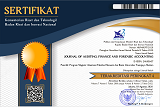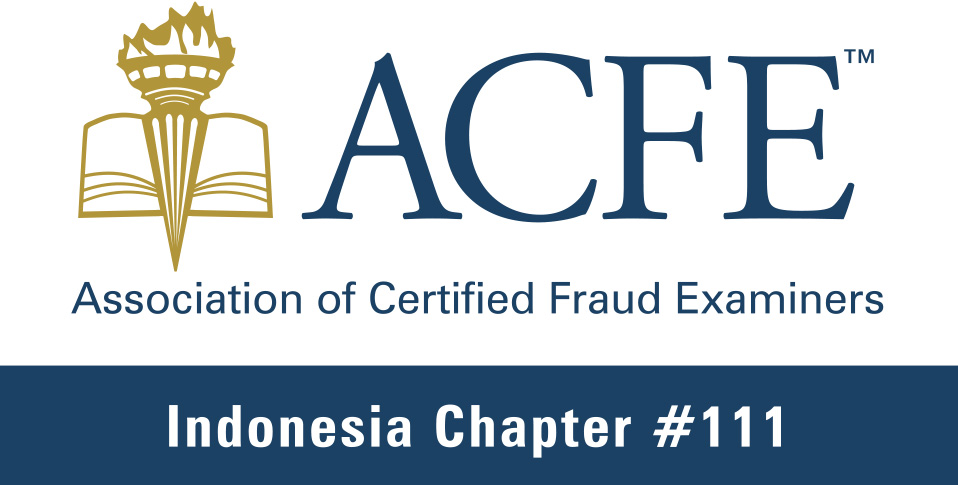HUMAN DEVELOPMENT INDEX AND AUDIT OPINION
Abstract
This study aims to investigate: the influence of human development indeks (HDI) and growth of HDI on auditor opinion and the difference between the level of HDI entities that get the predicate of qualified opinion or non qualified opinion. The data of this research comprise 1.482 out of 496 regency/cities governments in Indonesia during 2014-2016. The analysis techniques used are multiple regression and independent simple t test. The results of this study show that the human development indeks has influence on auditor opinion, the growth of human development indeks has influence on auditor opinion. The results of this study also found that the average performance of HDI between regency/ cities in Indonesia is different between of qualified opinion or non qualified opnion.
Keywords
Full Text:
PDFReferences
Adzani, Hafidjan Ahmad dan Dwi Martani. 2012.Pengaruh Kesejahteraan Masyarakat, Faktor Politik Dan Ketidakpatuhan Regulasi Terhadap Opini Audit Laporan Keuangan Pemda. Prosiding SNA Mataram.
Akbar, Bahrullah dan Djazuli, Achmad. 2015. Audit Keuangan dan Kesejahteraan Rakyat. Studi Pada Kab. Badung, Tabanan dan Kota Denpasar Tahun 2013. Jurnal Tata Kelola & Akuntabilitas Keuangan Negara, Volume 1, Nomor 1, Juli 2015: 1–19.
Arikunto, S. (2002). Prosedur Penelitian Suatu Pendekatan Praktek Edisi Revisi V. Jakarta: Rineka Cipta.
Badan Pusat Statistik – Bappenas - UNDP. Indonesia Human Development Report 2001 Towards a New Consensus: Democracy and Human Development in Indonesia.
BPS-Statistics Indonesia, Bappenas dan UNDP Indonesia. Jakarta: 2001.
Badan Pemeriksa Keuangan Republik Indonesia. 2017. IHPS II Tahun 2016.
Badan Pusat Statistik. Indeks Pembangunan Manusia 2016.Penerbit Badan Pusat Statistik. Jakarta
Despotis, D. K. (2005). Measuring human development via data envelopment analysis the case of asia and the pacific. OMEGA, Vol. 33(5), 385-390.
Fontanella, A., & Rossieta, H. (2014). Pengaruh Desentralisasi Fiskal dan Kinerja terhadap Akuntabilitas Pelaporan Keuangan Pemerintah Daerah di Indonesai.
Simposium Nasional Akuntansi XVII. Mataram, Lombok. G Giroux dan AJ McLelland. 2003. Governance structures and accounting at large municipalities. Journal of Accounting and Public Policy 22 (3), 203-230
Hartono, J. (2004). Metologi Penelitian Bisnis Salah Kaprah Pengalaman-Pengalaman. Yogyakarta: BPFE.
Ikhsan, A., Muhyarsyah, Tanjung, H., & Oktaviani, A. (2014). Metodologi Penelian Bisnis untuk Akuntansi dan Manajemen. Bandung: Citapstaka Media.
Lupia, Arthur dan Mathew McCubbins. 2000. Representation or abdication? How citizens use institutions to help delegation succeed. European Journal of Political Research 37: 291-307.
Mahmudi. (2011). Akuntansi Sektor Publik. Yogyakarta: UII Press.
Mardiasmo, 2005. Akuntansi Sektor Publik Edisi 2. Penerbit Andi. Yogyakarta
Ng’eni, Flavianus Benecdito. 2016. Theoritical Aspect Underpinning Public Sector Audit and Financial Accountability in Tanzanian Local Government Authorities (LGAs).
International Journal of Finance and Accounting, Vol. 5(1); 46-53.
http://article.sapub.org/10.5923 .j.ijfa.20160501.06.html diakses pada 26 September 2017
Nyman, Caroline dkk. 2005. Accountability in local Government: A Principal-Agent Perspective. Journal of Human Resource Costing & Accounting, Vol.9 Iss 2 pp. 123 – 137. http://emeraldinsight.com diakses pada 26 September 2017.
Peraturan Badan Pemeriksa Keuangan Republik Indonesia No. 01 tahun 2007 tentang SPKN.
Pradhan, R. P. (2007). India’s Human Development and Social Sector Expenditure in the Globalization Regime. Man and Development, Vol. 29 (1): 17-38.
Prasetyaningsih, Erny. 2014. Pengaruh Karakteristik Keuangan Daerah dan Temuan Audit Terhadap Kinerja Pemerintah pada Pemerintah Daerah Se-Indonesia. Thesis S2 Program Pasca Sarjana Magister Akuntansi Universitas Sebelas Maret Surakarta.
Ramachandran, H. (2002): Governance and People’s Participation: Vision 2020. In India Vision 2020: Report Plus Background Papers, Planning Commission, Government of India, New Delhi.
Republik Indonesia. 2004. Undang-undang No. 15 tahun 2004 tentang Pemeriksaan, Pengelolaan dan Tanggungjawab Keuangan Negara.
Sen, A. K. and Anand, S. (2000). The Income Component of the Human Development Index. Journal of Human Development, 1 (1), 83-106.
Swaroop, V., and Rajkumar, A. S. (2002). Public Spending And Outcomes: Does Governance Matter. World Bank Policy Research Working Paper.
Yuliani, S., Nadirsyah, & Bakar, U. (2010). Pengaruh Pemahaman Akuntansi, Pemanfaatan Sistem Informasi Akuntansi Keuangan Daerah dan Peran Internal Audit terhadap Kualitas Laporan Keuangan Pemerintah Daerah. Jurnal Telaah dan Riset Akuntansi Vol.3 No.2 Hal 206-220.
Zimmerman, J. L., (1977). The Municipal Accounting Maze an Analysis of Political Incentives, Journal of Accounting Research, 15, 107-141.
DOI: https://doi.org/10.21107/jaffa.v6i1.4326
Refbacks
- There are currently no refbacks.
Our Journal indexed by:
Our support tools using:



This work is licensed under a Creative Commons Attribution 4.0 International License.












